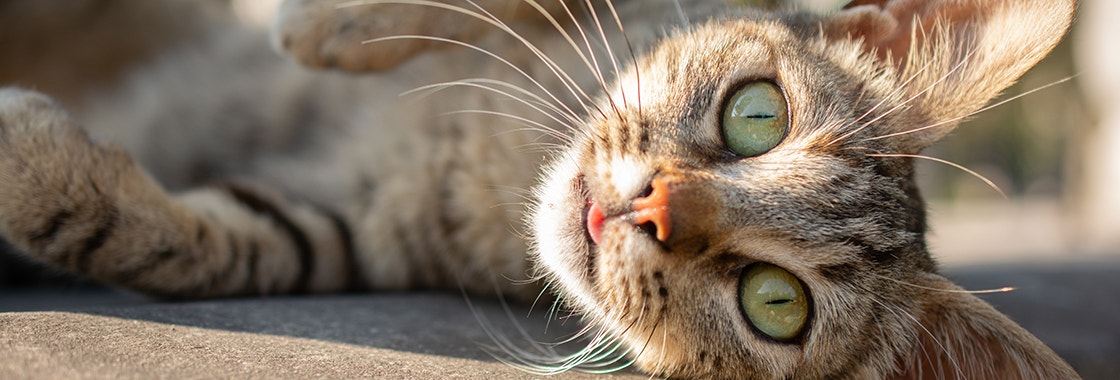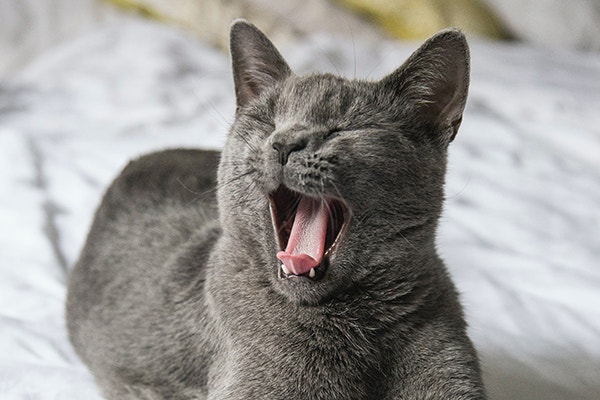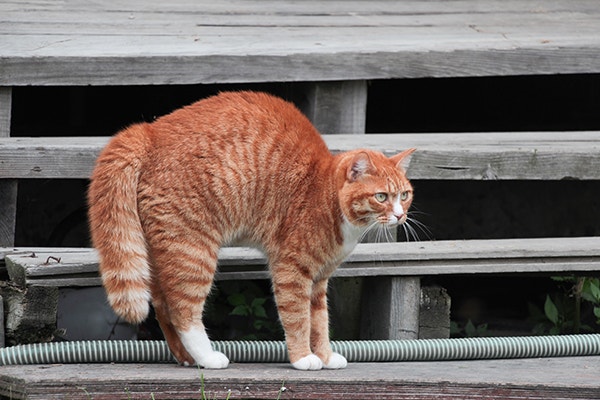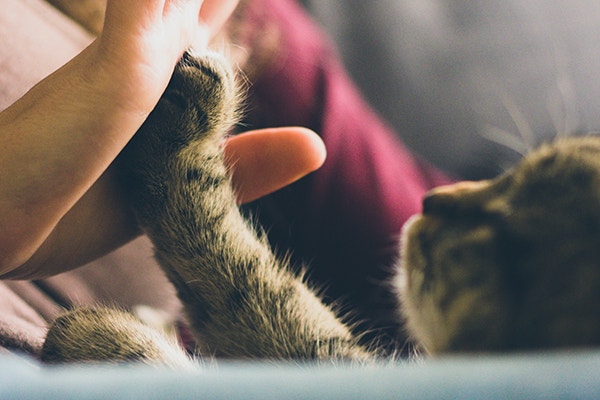- Homepage
- Blog
- Bonding & Care
- Cat Purring Loudly
Cat Purring Loudly: Discover The Reasons


Share
Proven to reduce stress in humans, the sound of a cat purring can be music to the ears of cat owners. The sound itself is created from the contraction and expansion of a cat’s larynx (voice box), causing the air to vibrate as your cat breathes and resulting in a purr. However, you may be wondering ‘why does my cat purr so loud?’. While cats purring loudly is typically a sign that they are truly content, there are other possible reasons that cat owners should know. In this article, we discuss why cats purr so loud, when it may be a sign of trouble, and how to respond to your cat’s loud purr. Understanding your cat’s vocal cues is key to knowing what they want and need, improving your relationship and supporting their overall well-being.
Why do cats purr loudly?
Cats purr loudly when they are content
There are many reasons why cats purr, but generally, your cat purring loudly is a way for them to express that they are feeling happy, relaxed and content. Loud purrs can also help cats with their breathing, managing pain, improving anxiety and healing their bodies.
While most cats purr at roughly 25 decibels, which is a dull hum, some cats can purr louder than this. This could be due to their genetics and breed, but also their age. As your cat gets older, their vocal cords will strengthen and create a louder purr compared to that of a kitten. In some cats, the muscles around their larynx and diaphragm may contract and expand more vigorously, also resulting in a louder purr. We look at what it means when a cat purrs loudly below.
Cats purr loudly when they are content
When cats purr so loud, it’s usually a positive sign that they feel content. It’s common for cats to purr loudly when they’re sitting near you and receiving attention. If you’re stroking them in their sweet spots, such as their chin or cheeks, your cat may purr loudly as a way to show their appreciation. Sometimes, cats can purr so loud even when you’re not touching them. This can reassure cat parents that their cat feels safe and comfortable in their home environment.
Cats purr loudly when they want food
A common reason why your cat is purring so loud is that they’re trying to tell you they want food. This begins as kittens, who start purring when they’re a few days old and their mothers use this as a way to find and feed them. Adult cats can continue this habit, and there will usually be other cues such as circling their food bowl or taking you to where their food is stored. There will also be more urgency to your cat’s loud purr.
Cats purr loudly to support their healing
It’s been thought that cats purring loudly can actually support their recovery time and repair their bodies if they’ve recently had an illness or injury. Since cats spend most of their time asleep, it allows their bodies to relax while endorphins are released into their system.
Cats purr loudly to calm anxiety and stress
Your cat may purr so loud as a way to soothe themselves if they’re feeling overwhelmed. Purring releases natural chemicals known as endorphins which can relieve the experience of anxiety, stress or pain. Similarly, if your cat has experienced a traumatic event, they may use this as a coping mechanism to help them recover.
Cats purr loudly to help with their breathing
A cat purring loudly can also support their breathing, as it’s thought that the vibrations created from purring can have a beneficial effect on a cat’s respiratory system. It may help to clear their airways and improve airflow. On the other hand, if your cat is experiencing any difficulties in breathing and you can hear that your cat is purring loudly, it may mean they have a respiratory problem - in this case, you should contact your vet.
When loud cat purring is a sign of trouble?
While you wouldn’t expect your cat’s purring to be a sign of trouble, if you’re wondering why your cat purrs so loud it’s important to know other possible causes. As we’ve discussed, cats may purr loudly to calm themselves after an overwhelming situation. However, your cat purring loudly could also be an expression of anxiety, stress or fear. In fact, some cats even purr to calm their nerves before they attack. Cat parents should observe their cat’s body language to understand how they’re feeling. If your cat has a direct stare, tense body, swishing tail or is in a crouched or arched position, they may be feeling on edge. You may even hear your cat growl as a warning. In this situation, don’t approach or comfort your cat even if they’re purring - instead, you should find and resolve their trigger, and provide space.
We’ve also discussed how a cat’s loud purr could have healing properties. In this case, a cat purring loudly could be experiencing pain or discomfort, feeling unwell from an illness or infection, or have an underlying medical condition. It can help cat parents to know what it means when their cat purrs so loud by looking at their overall behaviour. Cats who are seeking affection or attention may also knead or rub against you. However, a poorly cat may show other physical signs or symptoms, like gastrointestinal problems such as vomiting or diarrhoea, as well as changes in behaviour like lethargy and loss of appetite.
It’s important to differentiate between normal and abnormal purring, so you can seek veterinary attention for your cat when necessary.
How to respond to your cat’s loud purr?
While a cat purring loudly may sound the same at first, cat parents soon learn that their cats have slightly different purrs depending on their mood and what they want. Cat parents can interpret what their cat’s loud purr means along with their body language, to know how to respond accordingly.
More often than not, a loud purr is how cats show affection and love. If your cat is purring loudly and consistently because they’re comfortable and content, you’ll also notice a relaxed posture, kneading with their paws and slow blinking of their eyes. You can try to gently pet and praise your cat to see how they respond. Otherwise, if your cat purrs so loud as they follow you around, nudging you with their head or patting you with their paws, they may be wanting playtime - you can introduce an interactive toy to engage your cat.
Cats often purr so loud because they’re hungry, and you’ll notice that their purrs are more urgent. They may visit their food bowl and look at you expectantly - so check to see if it’s feeding time. On the other hand, if your cat is purring loudly and exhibits changes in their behaviour, such as hiding, loss of appetite and lethargy, they may be in pain or discomfort from an injury or illness. Consult a veterinarian if you think your cat’s loud purring means they are unwell.
Cats purring loudly can be reassuring to cat parents that they are happy and healthy. If you’re ever wondering why your cat purrs so loud, and you notice physical symptoms or changes in their behaviour, consult a veterinarian to rule out any health issues and to provide you with peace of mind. You can further support your cat’s contentment by serving SHEBA® UK Wet Cat Food, luxuriously crafted to provide your cat with essential nutrition through high-quality ingredients - as well as appease their appetite!
WHY DO CATS PURR LOUDLY: FAQ
Do cats purr loud when stressed?
Cats purr loudly for various reasons, including when they’re feeling stressed. Purring releases pheromones in cats which can help to relieve their stress, fear and anxiety. In some cases, however, a cat purring loudly can be a warning, especially if accompanied by other signs of aggression.
Why does my cat purr so loud when we cuddle?
Your cat purring loudly when you cuddle together is a positive sign that they are feeling happy, relaxed and content. It can also mean your cat is purring so loud in order to vocalise their affection and appreciation. Some cats naturally purr louder than others.
Why does my cat purr so loud when I pet her?
If your cat purrs loudly when you pet them, it’s usually because they feel happy with the affection and attention they’re receiving. You may be petting their favourite spots, which is making them feel relaxed and content, and they want to vocalise their appreciation to you.



